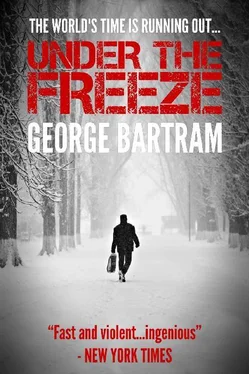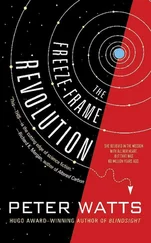When the servant was gone, Schneider said softly, “Would you be interested in undertaking a task for me?”
Tarp’s mental alarm went off, yet he was able to say lightly, “In what capacity? My intelligence, or my boldness?”
“Are you interested?”
“I am always interested in stimulating work.”
“Come to see me tomorrow morning, then. At the factory. About ten.” Schneider seemed about to say something else, but he thought better of it. The wheelchair hummed, and he moved off. Ahead of him the crowd of people opened and then parted like a sea and closed again behind him.
Now what is that all about ? Tarp thought, and, as if it were toward that point that the whole evening had built, he found himself left increasingly alone. He had met the people who mattered, the party seemed to say to him now, and he had been introduced to the women with whom he might lawfully flirt, and now he was on his own.
Given that head, Tarp decided to go home.
At the door he bumped into old Pope-Ginna, who was almost certainly waiting there for him, for he smiled hugely and put himself where Tarp could not possibly avoid him. “Going so soon, are you?” he said. He laughed. “Awfully early for a young chap like you to be slippin’ away, what with so many of the beautés here. Eh?” He held Tarp’s arm. “Owe you an apology. Made a frightful ass of myself earlier; rather got a tongue-lashing from mine host about it. Most abjects, etcetera. Do say that you forgive and forget, that’s a good fellow.”
“Of course. My pleasure, Admiral.”
The title did not seem strange to the old man. “You’re a decent fellow,” he said. He seemed to have been drinking a little too much, and his speech was faintly slurred.
“I spoke much too strongly, Admiral. It is I who owe you an apology.”
“Oh? Not at all. Damned decent of you to say. Damned decent. Look here. Why not have lunch with me at the Hurlingham Club one day. Tomorrow, for the matter of that. Eh? If you’d give an old fellow like me the pleasure of your etcetera for a few hours.”
Two in one evening . Not bad . He felt more than ever like a hapless bridegroom.
“Saw you chatting with Jock. Got along with our resident King Midas, did you?”
“I try to get along with everybody, Admiral.”
Pope-Ginna stared at him with slightly reddened eyes and then burst into loud and somehow inappropriate laughter. Something that Tarp had said had amused him hugely. He slapped Tarp’s shoulder and moved away, still laughing; then he seemed to see somebody he knew, and he said a hasty good night and was gone. When Tarp looked into the far room where most of the party was, he saw Pope-Ginna with one of the “butlers,” lifting another glass from a tray of champagne.
An odd party , Tarp thought. As if it had been put together for my benefit . But maybe that’s egoism . Except that there are no accidents .
Tarp retrieved his coat. The weight of the Luger dragged one side down, made it difficult to carry over his arm. He turned from the apartment doorway and looked back into the room where there was dancing.
He plummeted in the high-speed elevator. There were several other guests from the party, and he left it with them and stepped from the bright world of the apartment house into the soft darkness of the streets. The lights were slightly hazed; more distant ones looked less like jewels from down here. The pavements were wet but there was no rain, and, not seeing a taxi, he set out along a broad sidewalk. Two big American cars had been pulled up for the others. They sailed past him like boats setting out on placid water. Far away down the boulevard before him, another car came toward him, then turned off. The night became quiet. Music, almost ghostly now, came from somewhere above him and to his right, and he thought he recognized one of the tunes about the Malvinas that he had heard in Santiago.
It was about then that he realized he was being followed. He put his hand on the Luger in the overcoat pocket. He could hear only one person behind him. Still, it was definitely somebody following. He eased the safety off and waited.
He heard a car coming along the cross street before he saw it. The tires hissed on the wetness. The engine changed voice as the driver shifted down for the corner, then took it at speed, letting the tires squeal as he gunned down the boulevard toward Tarp. The house fronts came to the street here and there was nowhere for him to run except along the sidewalk itself. His strides lengthened; his eyes began to search the dark buildings for a hiding place or a handhold, for anywhere to make a stand.
The car passed him, but it was braking. Doors popped open. Two men were out of the car before it stopped and another was pulling himself awkwardly from the rear seat.
Is the death squad the purpose of wealth ? he had asked Schneider. It seemed squalid now. Violent death always seemed squalid to him — bodies left along highways; shallow graves with silent, frightened peasants watching. Stupid men like these, spilling from cars on sidewalks to commit murder — was this what it was all about?
Tarp pointed the Luger at the first man and pulled the trigger. The pistol was not loaded.
At the party . They unloaded it at the party .
He had dropped the overcoat into his left hand and he swung it forward and up to make a swirling wall between them; in its cover, he moved to his right and back-kicked and felt his foot meet the man’s chest.
There were no shots. They carried guns, but they had not used them.
In the country . First , a talk ; then the shots . The body by the road . The hands or the head cut off .
He wanted one of their guns. That was all he was thinking, to get the gun of the man he had kicked. There were three of them, one or two more in the car; he had little chance, perhaps no chance, but his body was doing its own thinking.
He let go of the coat, which settled over the man as he dropped toward the sidewalk. He was trying to see where his gun was going to fall when an automatic weapon started to fire. The shots came out like angry words, like those terrible, short, uncontrollable bits of hatred that are said when we mean things most.
The other two men fell to the pavement, one shrieking in Spanish. The machine pistol continued to chatter. Windows blew apart in the car. There was a change in the sound as another automatic weapon joined in.
A car came around the corner to his right and blocked the car at the curb. Men erupted from it. They knelt on the street and the sidewalk, using the doors as shields, and poured fire into the first car.
Tarp bent over the man he had kicked. He was stretching to grasp the man’s pistol when he was struck on the back of the head and he stopped seeing. He fell forward on his knees. He was still conscious; he felt his knees hit the stone. Blackness, then a slow brightening, the return of vision — stones, the sickly glare of the streetlight, the shadow of a tree — and pain in his head and his knees.
And then a sharp burning in his left shoulder. Hot. Spreading. Ice, fire, knife. An injection . It took all his strength to raise his head. He saw two men coming toward him, moving slowly and raising their knees as if they were walking in snow. He saw two bodies on the sidewalk. He saw that the first car had no glass in the windows anymore. He saw the driver with his head thrown back over the seat. He saw that the rear door on his side was open and the soles of two shoes were pointing at him through the opening.
He twisted his head to the left and heard himself groan when he did it. He used his last strength to twist his head farther. He was dropping forward on his hands and then his elbows. He put his right cheek down on the cool stones. He looked up — up legs, up thick waist, up black nylon jacket. Up. The throat. The jaw. The face.
Читать дальше












